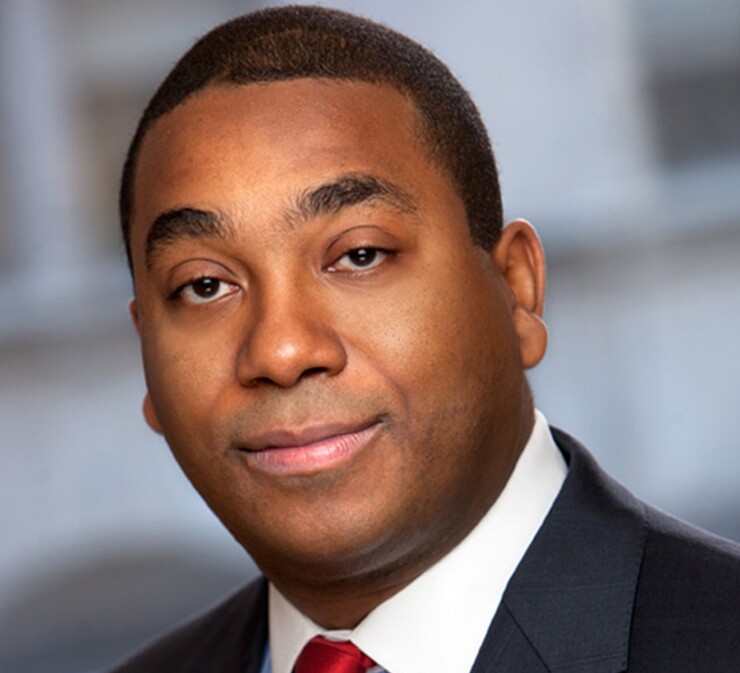PHOENIX – Pro sports stadium projects will probably find a path forward even if they lose access to tax-exempt financing.
Stadium projects in Las Vegas and San Diego are among those making new calculations in light of the possible demise of tax-exempt stadium bonds through congressional tax legislation. The GOP tax bill that emerged from the House would eliminate such financing for sports venues.
The House tax bill provisions would prevent tax-exempt bonds from being issued, retroactively to November, to finance professional sports stadiums. It would also strip tax-exempt status from private activity bonds issued after Dec. 31. The Senate version of the bill did not contain these provisions, but it remains unclear what a final tax reform bill will look like once approved by both chambers.

The highest-profile project hanging in the balance is the $1.9 billion, 65,000-seat Las Vegas National Football League stadium for which Clark County, Nev. has promised $750 million of support. The venue is to host the Raiders, relocating from their longtime home in Oakland, Calif.
Construction was anticipated to begin this fall, with the Raiders expected to move into the new stadium by 2020. The county is already collecting a new hotel tax that is to back the bonds once they are issued.
In California, San Diego State University might also be affected as it seeks to redevelop 166 acres of land surrounding the stadium formerly occupied by the NFL’s Chargers, who relocated to Los Angeles this year.
With details announced Nov. 29, the project seeks to build a new multi-use stadium for collegiate and professional sports, as well as other support facilities for the university’s academic missions and a 250-room conference center hotel. While the stadium would initially be built primarily for the SDSU football team, documents released by the university add that it would “accommodate professional soccer,” and also hinted that “the stadium is also expandable should the NFL ever return to San Diego.”
While SDSU officials did not respond to requests to be interviewed about the project’s financial plans, documents released by the school say that it would not rely on taxpayer dollars. A schools spokesperson told the San Diego Union-Tribune late last month that they did not know if potential partnerships with professional sports teams will affect the financing, which is not finalized. What plans have been floated indicate heavy private-sector involvement, which could implicate the use of private activity bonds which are commonly-deployed in public-private partnerships.
“We envision utilizing public-private partnerships to develop the commercial, retail and housing on the site, which will assist SDSU in realizing its higher educational mission,” according to
Sector observers generally agreed that a future without tax-exempt financing would probably not sink major stadium projects altogether, but would have significant affects in comparison with the status quo.
“The public has started to push back on public financing for stadiums in general,” said Randy Gerardes, a Wells Fargo Securities senior analyst, noting that there is an increasing public sentiment that professional sports teams shouldn’t be getting taxpayer money.
Without tax-exempt financing, these projects could still issue taxable bonds, Gerardes said, but the higher cost of financing would mean that the revenue stream backing the bonds wouldn’t go as far as it would in a tax-exempt scenario.
“The transaction could still be done,” Gerardes said. “It would either be smaller or you’d have less coverage.
“I think that the stadiums will still get built,” he added. “Certainly team owners would prefer to have a lower cost of capital.”
Fitch Ratings analyst Andy Joynt also noted an increasing public hostility to stadium financing.
“This isn’t a strictly partisan issue,” Joynt said. “The pressure has already been there, even before this tax bill.”
Joynt suggested a range of outcomes possible for projects moving forward under a new reality. Municipalities could contribute less, creating a funding gap that someone would need to fill by some other means. While many projects could go forward, some could get scrapped, he said.
“In some cases, the economics could be adverse enough that it could convince a league or an owner to say ‘we’re going to put off construction,’ or ‘we’re going to reinvest in the old stadium and stay a bit longer,’” said Joynt.
S&P Global Ratings analyst Jenny Poree said she believes most projects will continue to go forward even at a higher cost.
“We don’t view tax reform as a significant impediment to stadium financings going forward,” she said. “The cost of funding, with passage, will certainly increase. Higher borrowing costs could translate into a lesser financing benefit to team owners or a higher cost to taxpayers. That said, we believe there is significant market access in the taxable space. Further, bank financing options may become more attractive than long-term funding.
“Governmental entities selling bonds will see higher borrowing costs but we believe most planned financings will be pursued,” Poree continued. “Stadiums have contributed to the redevelopment and revitalization of communities throughout the country which can lead to increased revenues for municipalities. Conversely, there are stadiums that are a net negative to local government finances, requiring subsidies or unplanned public service costs that outweigh revenue generation. In instances where municipalities believe there is an economic development or revenue generating opportunity associated with stadium financings, we believe they will proceed, even at a higher cost.”
The NFL isn’t taking the matter lying down, reportedly pushing to protect not only its own status as a tax-exempt organization but also the path for tax-exempt stadium financing. According to OpenSecrets.org,
Sen. Dean Heller, R-Nev., told the Las Vegas Review-Journal that he does not support taxpayer-funded stadiums, but believes the Raiders should get an exemption because the project is already well underway.
Republican Congressional leaders have said they hope to deliver a final bill to Donald Trump’s desk by Christmas, while Democrats have vowed to fight it.





